Quick Summary: Hiring an AI developer is one of the most strategic business decisions you’ll make in 2026. This guide explains the key AI developer skills, how to avoid costly hiring mistakes, and the verified cost to hire AI developers. With actionable steps and real insights, it helps you make confident, data-driven hiring decisions for your AI journey.
Building an intelligent product begins with finding developers who have the right AI developer skills. Many businesses want smarter, faster, and more predictive applications. Finding the right developer often feels like searching for a needle in a haystack.
One wrong hiring decision causes wasted time, rising costs, and poor outcomes. The right decision turns complex data into clear business results.
According to the Economic Times, AI may add about $15.7 trillion to the global economy by 2030. The projected impact raises competition for proven talent across markets. Companies who understand AI developer required skills make better choices and avoid delays. (Source)
This guide shares practical steps and strategic hiring moves for business leaders. Readers will learn what skills are required for AI developer roles and how to evaluate candidates effectively.
Each step connects hiring decisions with measurable business outcomes while keeping pace with the latest AI trends that shape talent needs and innovation strategies.
What are the must-have AI developer skills for business success in 2026?
Hiring for AI success is not about collecting resumes; it is about identifying the exact AI developer skills that move your business forward.
Every organization must understand what skills are required for AI developer roles before starting any project. Each AI solution demands a different blend of technical and analytical expertise.
A developer who knows model design but lacks deployment experience can leave your product stuck in testing. Another who manages data well but ignores compliance can expose your company to serious risks. Understanding real AI use cases helps leaders connect technical skills with business impact.
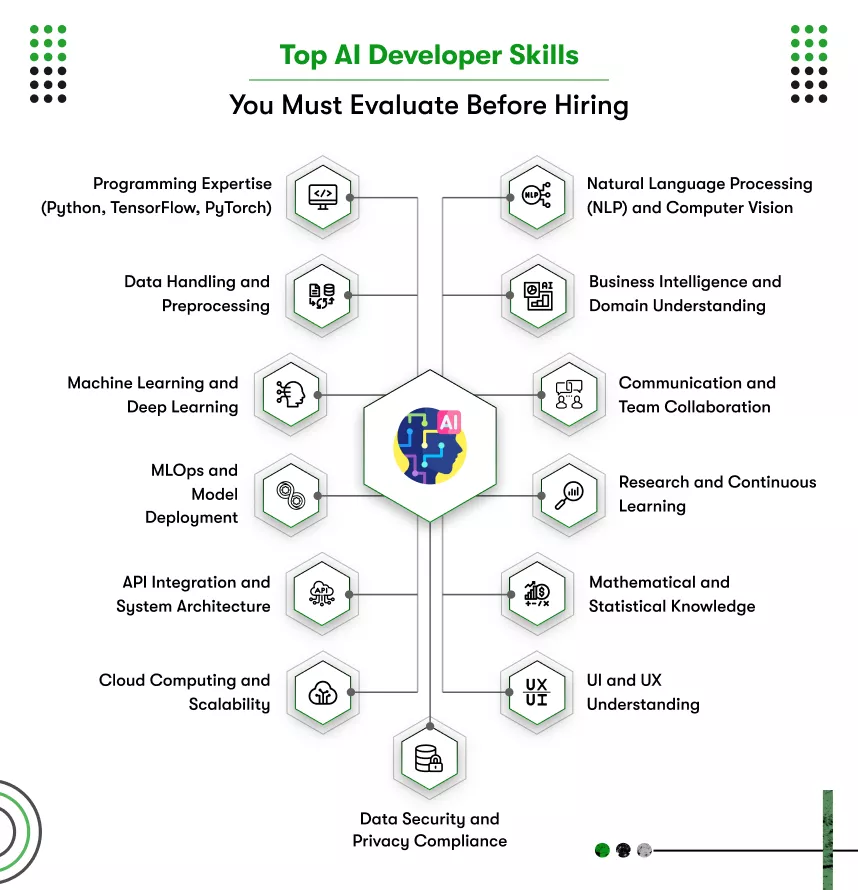
Knowing which skills create measurable results enables them to choose developers who build systems that perform, scale, and align with long-term business goals.
1. Programming Expertise (Python, TensorFlow, PyTorch)
Strong programming ability is one of the most crucial AI developer skills. Python, TensorFlow, and PyTorch enable efficient model training, testing, and deployment. Clean, modular code supports integration, scalability, and reliability. Leaders asking what skills are required for AI developer roles should prioritize proven programming depth.
Why Programming Expertise Is Important
Programming is the foundation of every AI application. It determines how smoothly the code executes, scales, and interacts with other systems. Without this capability, even a great idea struggles to reach production successfully.
Business Benefits of Programming Expertise
Businesses experience faster development cycles, cleaner deployment, and reduced errors. High-quality coding also simplifies maintenance and supports long-term innovation as new models or features are introduced.
Well-structured code becomes the foundation for implementing new AI business ideas quickly, helping companies adapt and scale their digital products with confidence.
Is Programming Expertise Essential or Optional?
Programming expertise is essential for every AI developer because it powers the core logic of all intelligent applications.
2) Data Handling and Preprocessing
Data handling within AI developer required skills involves collecting, cleaning, and organizing data for accurate model training. Skilled developers build reliable pipelines that prevent bias, reduce noise, and maintain quality through validation and continuous monitoring.
Why Data Handling Is Important
Data quality determines model behavior under real workloads. Balanced, representative datasets prevent misleading trends and fairness issues. Strong pipelines reduce manual fixes during retraining.
Business Benefits of Data Handling
Accurate inputs produce decisions executives can trust. Reduced noise cuts cloud spend during experimentation. Consistent schemas simplify integration with reporting systems.
Is Data Handling Essential or Optional?
This skill is essential because no AI model can perform correctly without high-quality, well-processed data.
3. Machine Learning and Deep Learning
Machine learning and deep learning form the foundation of intelligent behavior. These AI developer skills let systems learn from data, detect patterns, and make accurate predictions that drive smarter business processes and continuous improvement.
Why Machine Learning and Deep Learning Are Important
They enable systems to adapt automatically and improve performance with new information. Without these abilities, AI cannot deliver predictive or personalized outcomes. Developers must understand algorithms, neural networks, and evaluation metrics thoroughly.
Business Benefits of Machine Learning and Deep Learning
Businesses gain automation, efficiency, and competitive insights. Adaptive models reduce manual intervention and improve user experiences. Predictive features generate measurable cost and time savings.
Are Machine Learning and Deep Learning Essential or Optional?
They are essential because they define the intelligence behind every AI-driven product.
4) MLOps and Model Deployment
MLOps preserves performance after launch. Pipelines automate training, testing, promotion, and rollback for reproducible releases. Skilled developers take ownership of monitoring, alerting, and retraining to maintain accuracy, safety, and transparency across production environments.
Why MLOps Is Important
Models degrade without monitoring and refreshing schedules. Automated checks detect drift before customers notice. Versioned artifacts enable reproducible releases and recovery.
Business Benefits of MLOps
Stable performance reduces incidents and churn. Faster rollouts shorten time to value. Observability strengthens audit readiness and stakeholder confidence. In modern AI app development, these factors ensure reliability and transparency, allowing teams to deliver consistent user experiences while maintaining compliance and operational trust.
Is MLOps Essential or Optional?
MLOps is essential because production systems require reliability, traceability, and timely recovery.
5. API Integration and System Architecture
API integration and strong architecture help connect AI models with existing software. Developers with advanced AI developer skills create secure, efficient, and scalable systems. Proper integration ensures insights flow smoothly into your tools, improving performance and reducing manual operations.
Why API Integration and Architecture Are Important
AI generates value only when connected to business systems. Strong architecture ensures models, APIs, and databases work together reliably. It allows seamless communication across departments, preventing delays and data duplication.
Business Benefits of API Integration and Architecture
Businesses achieve faster workflows, better collaboration, and real-time analytics. Unified systems reduce dependency on manual reports and support consistent decision-making. Integration also lowers maintenance costs by simplifying updates and scaling.
Is API Integration Essential or Optional?
This skill is essential because every enterprise AI system must interact efficiently with multiple platforms, databases, and user interfaces.
6. Cloud Computing and Scalability
Cloud computing expertise enables scalable and cost-efficient AI applications. Developers with AI development require skills in cloud architecture design systems that handle large data, ensure uptime, and adjust capacity instantly without infrastructure limitations or performance loss during heavy workloads.
Why Cloud Computing and Scalability Are Important
AI models demand high processing power and constant availability. Cloud platforms support dynamic scaling and global access. They provide storage, deployment, and monitoring flexibility essential for real-time operations.
Business Benefits of Cloud Computing and Scalability
Businesses save infrastructure costs, improve reliability, and deliver faster updates. Scalability ensures smooth performance as usage grows. Cloud solutions simplify management and enable worldwide deployment with minimal setup.
Is Cloud Computing Essential or Optional?
Cloud computing and scalability are essential for any business aiming for growth and global accessibility.
7. Data Security and Privacy Compliance
Data security and compliance are key AI developer skills that protect sensitive information. Developers implement encryption, access control, and anonymization to meet GDPR, HIPAA, or ISO standards. These measures build customer confidence and protect companies from data misuse or breaches.
Why Data Security and Compliance Are Important
AI models process personal and confidential information. Poor security risks financial loss and reputation damage. Skilled developers design architectures that secure every stage of data storage and transfer.
When building a generative AI solution, strong security measures become even more critical to protect intellectual property, user data, and model integrity throughout the entire development lifecycle.
Business Benefits of Data Security and Compliance
Businesses earn customer trust and reduce compliance risks. Secure systems attract enterprise clients and minimize downtime from incidents. Maintaining privacy standards also improves brand credibility in global markets.
Is Data Security Essential or Optional?
Data security is essential for every AI project handling user or business information.
8. Natural Language Processing (NLP) and Computer Vision
Natural language processing and computer vision expand AI developer skills for text, speech, and imagery. Teams deliver search, summarization, extraction, detection, and recognition in products. Domain tuning improves relevance, while datasets improve accuracy for assistants, support, quality checks, and understanding.
Why NLP and Computer Vision Are Important
These technologies help machines understand natural input and automate communication. They enable chatbots, quality checks, and content analysis. By processing human language and visuals, businesses unlock deeper data insights.
Business Benefits of NLP and Computer Vision
Faster customer responses, better accuracy, and improved product quality follow. Visual and text analytics strengthen security and personalization. These skills elevate user experience and efficiency across operations.
Are NLP and Computer Vision Essential or Optional?
They are optional but extremely valuable for companies focusing on communication, media, or customer-facing products.
9. Business Intelligence and Domain Understanding
Business intelligence combined with domain understanding aligns AI with organizational goals. Developers with strong AI developer skills translate business needs into measurable KPIs, ensuring AI projects deliver results that enhance efficiency, reduce costs, and improve competitive advantage.
Using modern AI development platforms, teams can streamline workflows, integrate analytics, and accelerate the deployment of data-driven business solutions.
Why Business Intelligence and Domain Understanding Are Important
Without context, even advanced AI fails to generate value. Domain knowledge ensures solutions meet industry requirements and support real objectives. Developers bridge technology with business strategy to drive outcomes.
Business Benefits of Business Intelligence and Domain Understanding
Projects stay goal-focused and generate measurable returns. Businesses optimize operations and gain predictive insights for smarter planning. This skill reduces wasted investment and strengthens leadership decisions.
Are Business Intelligence and Domain Understanding Essential or Optional?
They are essential for senior developers, consultants, and leadership roles in AI development.
10. Communication and Team Collaboration
Strong communication remains one of the most practical AI developer skills. Developers who share progress clearly, coordinate with cross-functional teams, and explain technical updates to non-technical stakeholders prevent confusion and build smooth, transparent workflows that deliver results.
Why Communication and Collaboration Are Important
AI projects combine experts from data, design, and business units. Clear updates prevent rework and missed deadlines. Transparent dialogue ensures everyone understands responsibilities and outcomes.
Business Benefits of Communication and Collaboration
Cross-functional collaboration shortens timelines, reduces risks, and builds trust. Teams respond quickly to issues and align around shared goals. Better communication improves delivery predictability.
Are Communication and Collaboration Essential or Optional?
They are essential across all AI roles to maintain clarity and accountability.
11. Research and Continuous Learning
Continuous learning defines the growth mindset within AI developer required skills. Developers who follow new frameworks, experiment responsibly, and adapt to evolving best practices keep products relevant and efficient, ensuring long-term competitiveness in the AI marketplace.
Why Continuous Learning Is Important
AI technologies advance rapidly. Developers must learn, test, and integrate new tools regularly. Staying updated prevents outdated practices and enables continuous improvement.
Business Benefits of Research and Continuous Learning
Businesses stay ahead of competitors with modern, high-performing solutions. Knowledge-sharing fosters innovation and builds a stronger in-house capability. Adaptability reduces technical debt and long-term costs.
Are Research and Continuous Learning Essential or Optional?
They are essential for mid-level and senior AI professionals who lead or mentor teams.
12. Mathematical and Statistical Knowledge
Mathematics and statistics form the foundation of reliable AI. These AI developer skills enable developers to understand data distributions, validate models, and calculate probability, ensuring models behave accurately and consistently under real-world conditions.
Why Mathematical and Statistical Knowledge Is Important
Numbers explain AI behavior and prevent overfitting. Understanding equations and metrics ensures fairness, accuracy, and stability. Developers diagnose issues faster and optimize models efficiently.
Business Benefits of Mathematical and Statistical Knowledge
Businesses gain confidence in results through measurable accuracy. Data-backed insights strengthen decision-making. Proper statistical analysis reduces rework and project risk.
Evaluating the ROI of AI apps helps organizations understand how accurate models directly influence profitability, guiding smarter investments and long-term growth strategies.
Is Mathematical and Statistical Knowledge Essential or Optional?
Mathematical and statistical knowledge remains essential for modeling responsibilities.
13. UI and UX Understanding
UI and UX understanding enhance AI usability. Developers with these AI developer skills ensure that complex algorithms appear simple through clear interfaces, visual feedback, and smooth interactions that improve engagement and accessibility.
Why UI and UX Understanding Is Important
Even the smartest model fails if users find it confusing. Good design encourages adoption, clarity, and confidence. Accessibility expands reach and ensures usability for diverse audiences.
Business Benefits of UI and UX Understanding
Better interfaces increase satisfaction, loyalty, and trust. Clear experiences reduce training needs and support costs. Usable design accelerates adoption across teams.
Is UI and UX Understanding Essential or Optional?
UI and UX understanding remains optional for internal analytics, yet strongly recommended for customer-facing experiences.
Every organization that aims to build AI-based products must focus on these AI developer skills before hiring. A clear understanding of skill relevance saves money, improves project success rates, and prevents unnecessary delays.
Partnering with a team that specializes in AI development services ensures access to experienced developers who combine technical depth with business understanding. Each project is designed to deliver measurable value, maintain secure performance, and support scalable AI solutions tailored to specific enterprise goals.

How to Hire an AI Developer Without Costly Mistakes
Hiring an AI developer is not only about technical capability but about fit, responsibility, and business awareness. Each wrong decision delays progress and adds unnecessary costs. The following steps help leaders hire with precision and confidence.
1. Define Measurable AI Outcomes, Not Vague Ambitions
Start with business outcomes before reviewing candidates. When success is defined in measurable terms, choosing the right AI developer skills becomes straightforward. Clear objectives connect technical milestones to financial and operational impact.
Action Steps:
- Define how AI will create business value, not only technical functionality or automation.
- Use measurable goals like “increase lead conversion by 25%” or “reduce churn by 40%.”
- Align every AI initiative with existing processes and clear ROI expectations.
- Share documented outcomes with your hiring team to guide the evaluation process.
2. Evaluate Technical Skills Through Real Scenarios
Generic coding tests cannot measure real ability. The best assessment is practical. Ask candidates to solve short, business-relevant problems that reveal logic, creativity, and ownership. This helps verify genuine AI developer required skills.
Action Steps:
- Offer a pilot problem similar to your actual business workflow or dataset.
- Observe how the developer approaches assumptions, error handling, and explainability.
- Evaluate problem-solving speed, reasoning clarity, and communication during the process.
- Review code readability, commenting style, and understanding of deployment requirements.
3. Review Their Approach to Data Quality and Ethics
Every AI system depends on clean, fair, and transparent data. Ask developers how they manage validation, bias reduction, and compliance. Responsible data handling separates professionals from hobbyists.
Action Steps:
- Question how they identify and remove duplicate, inconsistent, or incomplete data.
- Check their understanding of ethical frameworks and global data-protection laws.
- Ensure they use secure access protocols for sensitive or regulated information.
- Ask for previous examples of bias detection and mitigation during model training.
4. Test Collaboration Through Short Pilot Engagements
A small pilot project reveals more than any interview. It shows accountability, adaptability, and delivery quality. Companies that run pilots make better long-term hiring decisions and avoid unexpected costs.
Action Steps:
- Assign a clear, time-bound task with measurable success metrics and data constraints.
- Review communication style, problem escalation speed, and solution documentation quality.
- Observe how developers handle scope changes, testing feedback, and performance tuning.
- Compare pilot results with promises made during the interview to assess honesty.
5. Assess Business Understanding, Not Only Coding Knowledge
AI developers who understand business context deliver solutions that actually work in production. The ability to connect technical models with KPIs and strategy determines project success.
Action Steps:
- Ask them to describe how their previous projects improved measurable business metrics.
- Evaluate how they balance model accuracy, maintenance cost, and delivery timelines.
- Ensure they can communicate AI’s value to executives without using technical jargon.
- Look for awareness of revenue, efficiency, and customer experience implications.
6. Prioritize Security, Scalability, and Maintenance
AI projects must sustain performance under growth and compliance pressure. Developers with the right AI developer skills prepare for these from day one instead of after deployment.
Action Steps:
- Ask how they handle model retraining, patching, and version management over time.
- Ensure they propose secure infrastructure with proper access control and encryption.
- Evaluate understanding of scalability across distributed servers or cloud environments.
- Check if they document backup, rollback, and monitoring procedures for recovery.
7. Validate Communication and Team Compatibility
AI development involves designers, analysts, and executives. Smooth communication prevents silos and misalignment. The best hires explain progress clearly and collaborate across departments.
Action Steps:
- Discuss how they manage handoffs between data engineering, design, and QA teams.
- Ask for past examples where good communication improved deadlines or deliverables.
- Review written documentation, commit messages, and progress reports for clarity.
- Observe how respectfully they accept feedback and coordinate during problem resolution.
8. Calculate the Real Cost to Hire AI Developers
Hiring is not limited to salary figures. Include tools, datasets, infrastructure, and retraining costs. Understanding the cost to hire AI developers ensures accurate budgeting and transparent expectations.
Action Steps:
- Estimate expenses for software licenses, cloud credits, and monitoring tools.
- Add costs for onboarding, project management, and internal resource alignment.
- Compare in-house hiring versus working with a full AI development company.
- Use detailed breakdowns to predict long-term maintenance and upgrade expenses.
9. Develop a Long-Term Retention and Growth Strategy
AI projects mature over time and require consistent learning, adaptation, and support. A retention-focused approach ensures that developers stay motivated, aligned, and productive throughout the partnership.
Action Steps:
- Provide access to advanced tools, updated frameworks, and skill-development resources.
- Offer recognition and rewards linked to measurable contribution and innovation outcomes.
- Conduct regular performance reviews and set achievable professional growth objectives.
- Maintain transparent communication regarding upcoming projects and technology roadmaps.
10. Work With Experienced Consultants for Structured Hiring
If you lack technical evaluation experience, involve specialists who understand what skills you want when hiring an AI developer. Expert consultants help design assessments, verify portfolios, and validate coding proficiency with objectivity.
Action Steps:
- Choose consultants with proven experience in evaluating AI-related technical roles.
- Ask for detailed reports outlining candidate strengths, weaknesses, and project fit.
- Ensure that assessments include practical challenges aligned with your business goals.
- Review consultant recommendations with your management team before making final offers.
Hiring the right AI developer demands strategy, structure, and foresight. When leaders combine business clarity with technical evaluation, hiring becomes efficient and risk-free.
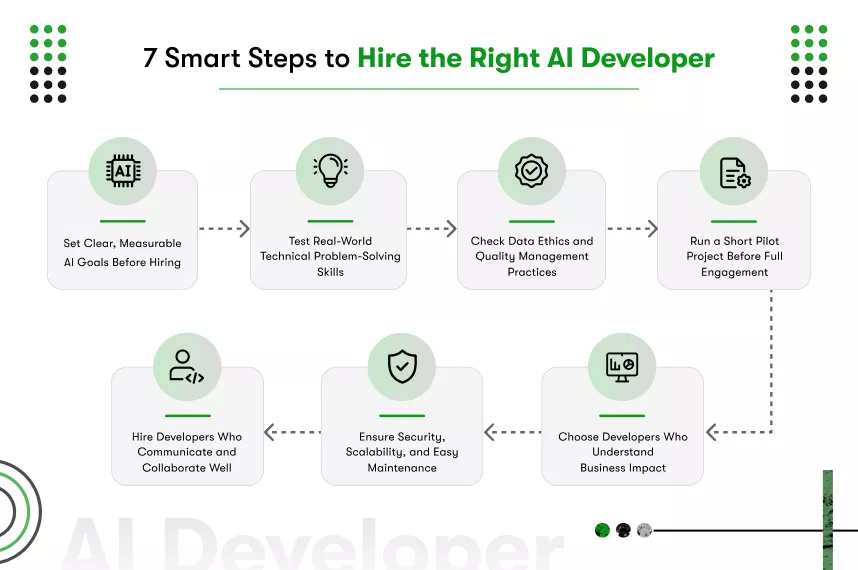
Each step outlined here builds confidence, improves ROI, and ensures that AI projects deliver measurable business value.
Cost to Hire AI Developers Explained: What Businesses Actually Pay in 2026
The cost to hire AI developers depends on experience, location, and project complexity. Verified industry data shows average rates from US $25 to $200 per hour globally, with total monthly costs ranging between US $4,000 and $15,000 depending on expertise and engagement model.
Understanding the overall AI app development cost also helps businesses plan budgets more accurately and evaluate long-term returns before hiring developers.
1. What Shapes the Cost to Hire AI Developers
Several factors determine the total investment when hiring AI talent. The key is to evaluate both short-term project needs and long-term ownership costs. Businesses that plan early avoid unexpected budget overruns and delivery delays.
Action Steps:
- Understand your AI project’s complexity, such as predictive analytics, automation, or real-time personalization.
- Define the number of developers required based on workload, timeline, and technical depth.
- Review the level of experience you need, from junior engineers to senior data scientists.
- Include infrastructure, model maintenance, and retraining costs when forecasting total spending.
2. Average Hourly Rates Based on Verified Data
According to verified sources such as Flexiple and Xicom, the average cost to hire AI developers globally ranges between US $25 to $200 per hour, depending on region and expertise. These figures reflect actual market conditions across 2024–2025.
| Region | Typical Hourly Rate | Expertise Level |
| USA / North America | US $120 – $140/hr | Senior AI Developer |
| Western Europe / UK | US $150 – $180/hr | Senior / Specialist |
| Eastern Europe | US $50 – $100/hr | Mid to Senior |
| India / South Asia | US $20 – $30/hr | Mid to Senior |
| Latin America | US $40 – $80/hr | Mid to Senior |
These regional averages give decision-makers realistic expectations when comparing hiring models or selecting outsourcing destinations.
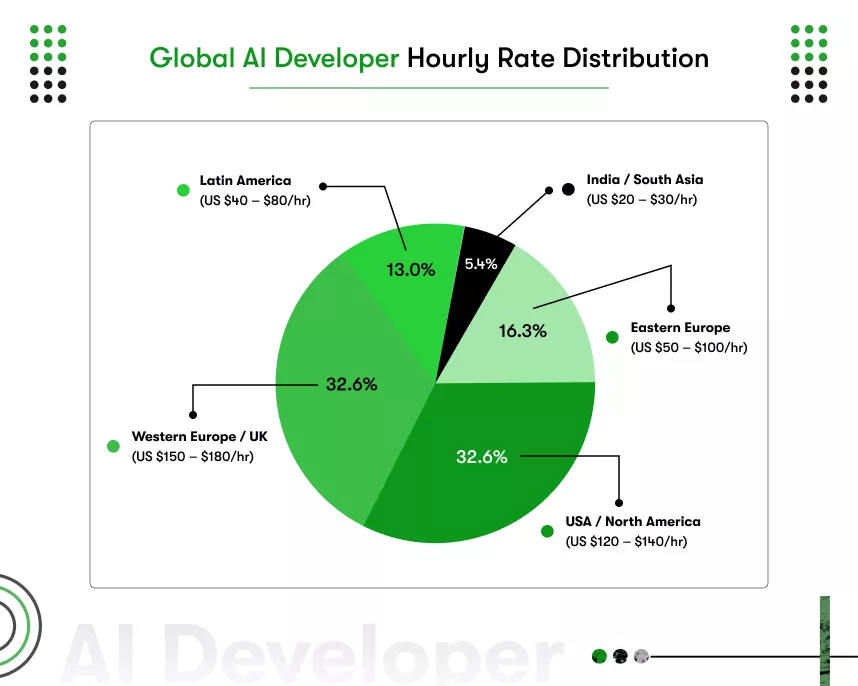
3. Cost Factors Businesses Commonly Overlook
Many companies miscalculate true hiring costs by ignoring secondary expenses that appear after development begins. When planning budgets for AI developer required skills, these additional costs should always be considered.
Action Steps:
- Account for cloud-service fees, GPU usage, and required third-party tool subscriptions.
- Include data-labeling, cleansing, and acquisition expenses needed for reliable model training.
- Factor in model retraining, version control, and continuous monitoring costs after deployment.
- Reserve funds for documentation, compliance audits, and long-term support to maintain reliability.
4. Real-World Project Cost Example
To help visualize realistic budgets, let’s look at an example based on authenticated market rates. Hiring one mid-level AI developer from Eastern Europe at US $75/hour for 160 hours per month equals roughly US $12,000 monthly. Adding standard infrastructure and management overheads (about 25%) brings the total to US $15,000 per month.
Over a six-month project, the total cost averages US $90,000. These figures represent what businesses typically invest when they plan to build AI chatbots app or similar enterprise-grade AI solutions, aligning with real implementation data verified across the industry.
5. How to Control Costs Without Sacrificing Quality
Controlling spending is not about cutting quality but about managing scope and optimizing efficiency. Businesses that apply structured processes can maintain strong output while keeping the cost to hire AI developers under control.
Action Steps:
- Start with a short pilot project that validates technical skill and delivery discipline before scaling development.
- Build a blended team structure that combines local strategy roles with remote engineering expertise.
- Use managed cloud services to monitor costs, scale resources dynamically, and avoid unused capacity.
- Define payment models based on milestones and measurable performance outcomes to ensure accountability.
- Integrate proven open-source frameworks to accelerate feature delivery and minimize redundant coding costs.
6. Why Strategic Hiring Partners Reduce Cost and Risk
Companies often overpay when they lack technical evaluation experience. Partnering with a firm that understands what skills you want when hiring an AI developer ensures better cost predictability, skill alignment, and faster delivery.
Action Steps:
- Choose partners who specialize in AI development and have verified case studies across industries.
- Confirm they provide transparent pricing, clear documentation, and a measurable success framework.
- Evaluate their ability to manage compliance, security, and scalability requirements across global markets.
- Prioritize firms that offer end-to-end ownership, from discovery to post-deployment monitoring.
The cost to hire AI developers depends on goals, expertise, and location. However, the right strategy ultimately determines how efficiently the investment delivers results.
Businesses that plan budgets carefully, test before scaling, and choose qualified partners gain faster results and avoid financial surprises.
Kody Technolab Limited helps enterprises worldwide access skilled professionals who combine technical precision with business insight. Companies looking to hire AI developers can rely on Kody’s transparent pricing, dependable delivery, and scalable engagement models. Each partnership ensures that every investment leads to measurable outcomes and long-term success in AI-driven innovation.
Conclusion
Hiring the right AI developer is the turning point between innovation and inefficiency. Each factor covered in this guide helps businesses reduce risks, improve outcomes, and achieve faster results. Companies that act early gain a clear competitive edge and long-term scalability. Now is the time to move from learning to implementing. Define your goals, identify the required skills, and start your hiring journey today.
Kody Technolab Limited, a trusted generative AI development company, supports organizations worldwide in building powerful, reliable, and scalable AI-driven software. Our experts help businesses plan, develop, and launch intelligent systems that automate workflows, enhance decision-making, and increase profitability with complete transparency and measurable ROI.

Frequently Asked Questions About Hiring AI Developers
1. What skills are required for AI developer roles?
The most important AI developer skills include programming in Python, experience with TensorFlow or PyTorch, data handling, model deployment, and MLOps. Developers must also understand cloud computing, API integration, and data security to ensure scalable and compliant AI systems.
2. How do I evaluate the right AI developer for my project?
Look for practical experience, not just certificates. Ask candidates to solve real business problems using your data. The right AI developer required skills include strong analytical thinking, clear communication, and an understanding of your industry’s operational challenges.
3. What is the average cost to hire AI developers worldwide?
Verified data from industry sources shows that the cost to hire AI developers ranges between US $25 and $200 per hour, depending on location and experience. For a six-month project, most mid-level developers cost between US $60,000 and $90,000 in total.
4. How long does it take to hire an AI developer?
Hiring timelines vary with project complexity. For most businesses, screening, testing, and onboarding take two to six weeks. Partnering with an experienced team shortens hiring cycles because assessments, technical tests, and documentation are already standardized.
5. Should I hire a freelancer or work with a dedicated AI team?
Freelancers are suitable for short experimental tasks, while dedicated teams are ideal for enterprise AI solutions that require maintenance and scalability. Companies that choose a structured team with verified AI developer skills gain faster delivery and post-launch support.
6. How can my business control AI development costs without losing quality?
Start with a small pilot to validate results before scaling. Use open-source frameworks, managed cloud services, and milestone-based contracts. A transparent approach keeps the cost to hire AI developers predictable while maintaining high project standards.
7. Why choose Kody Technolab to hire AI developers?
Kody Technolab Limited is a global generative AI development company that helps businesses hire experts who deliver measurable impact. Our developers specialize in predictive analytics, automation, and generative AI solutions designed to optimize cost, performance, and long-term scalability.

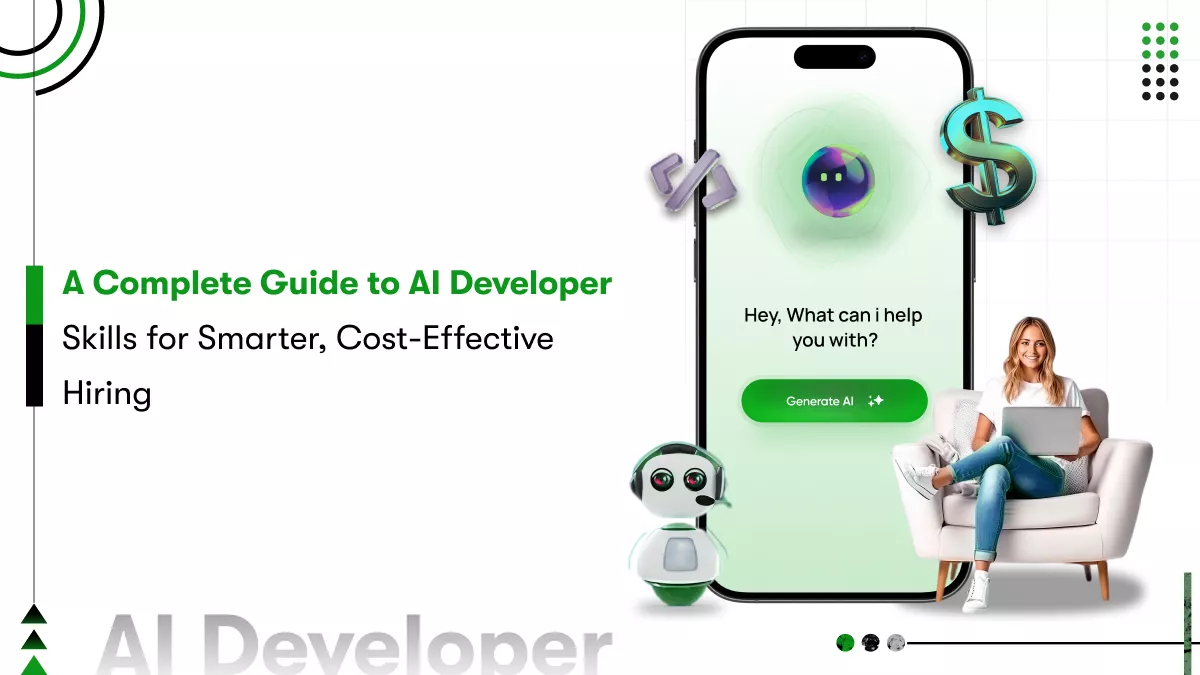
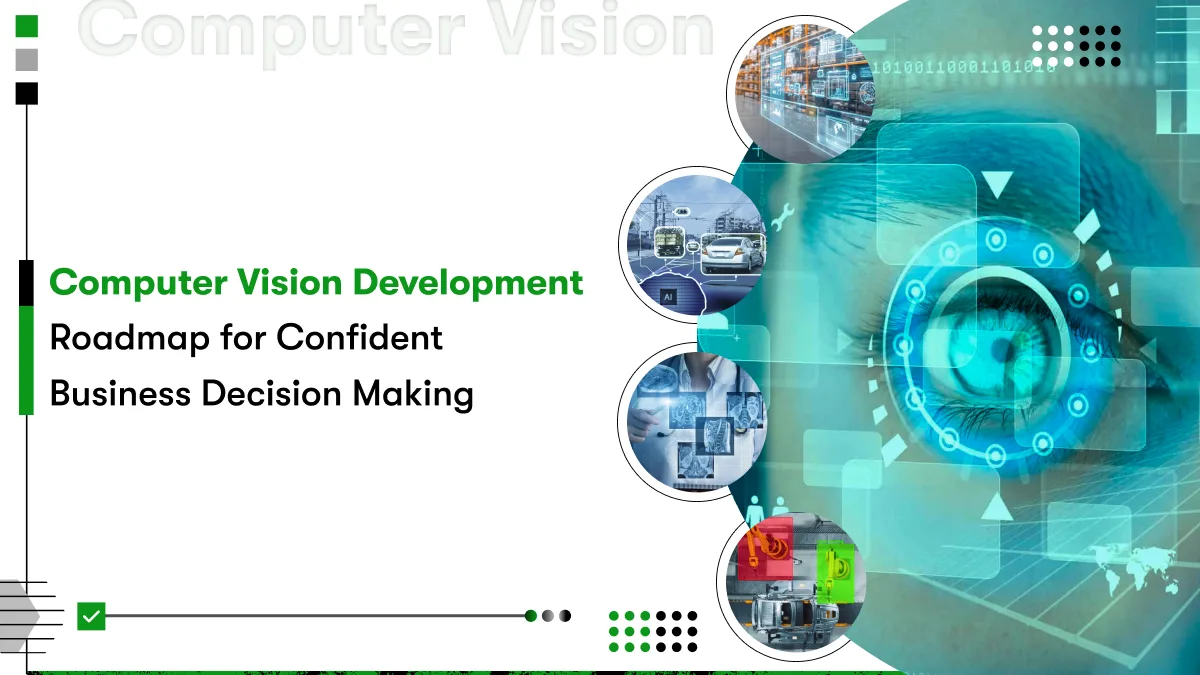
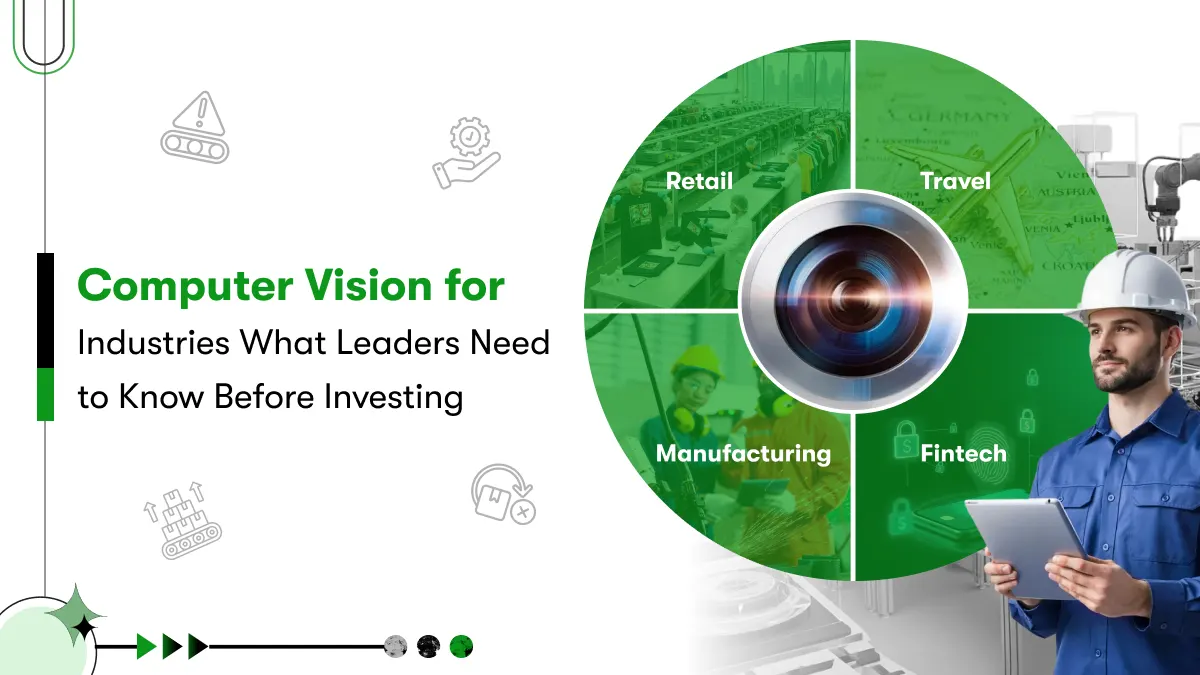

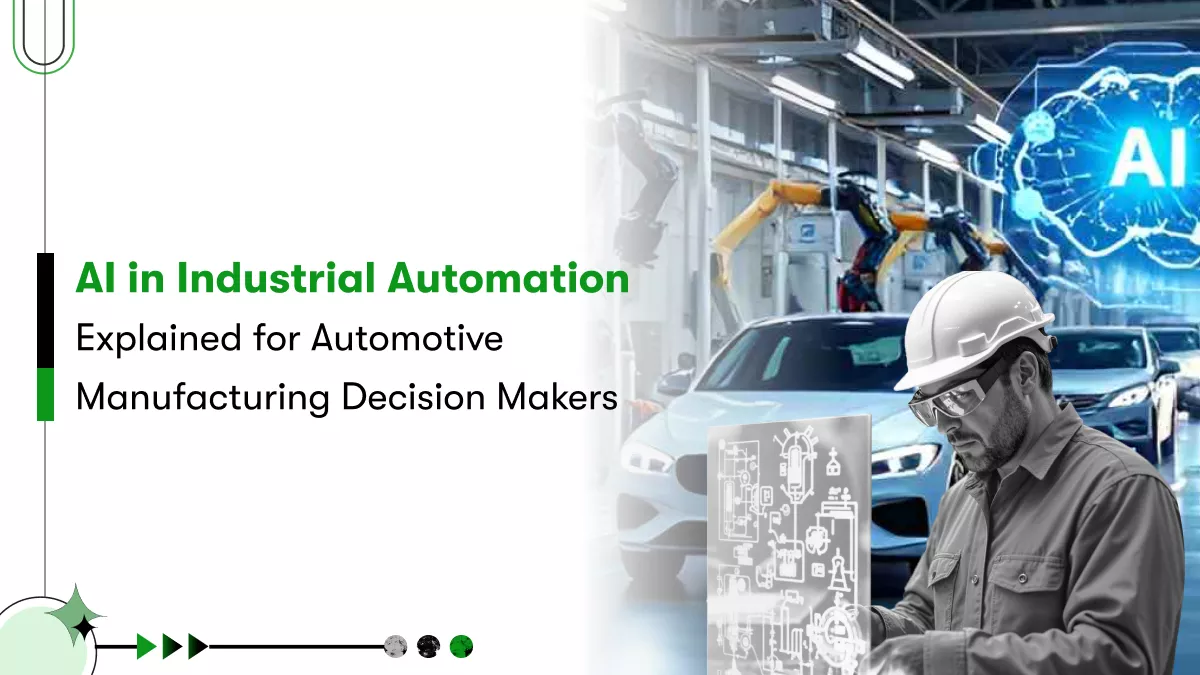
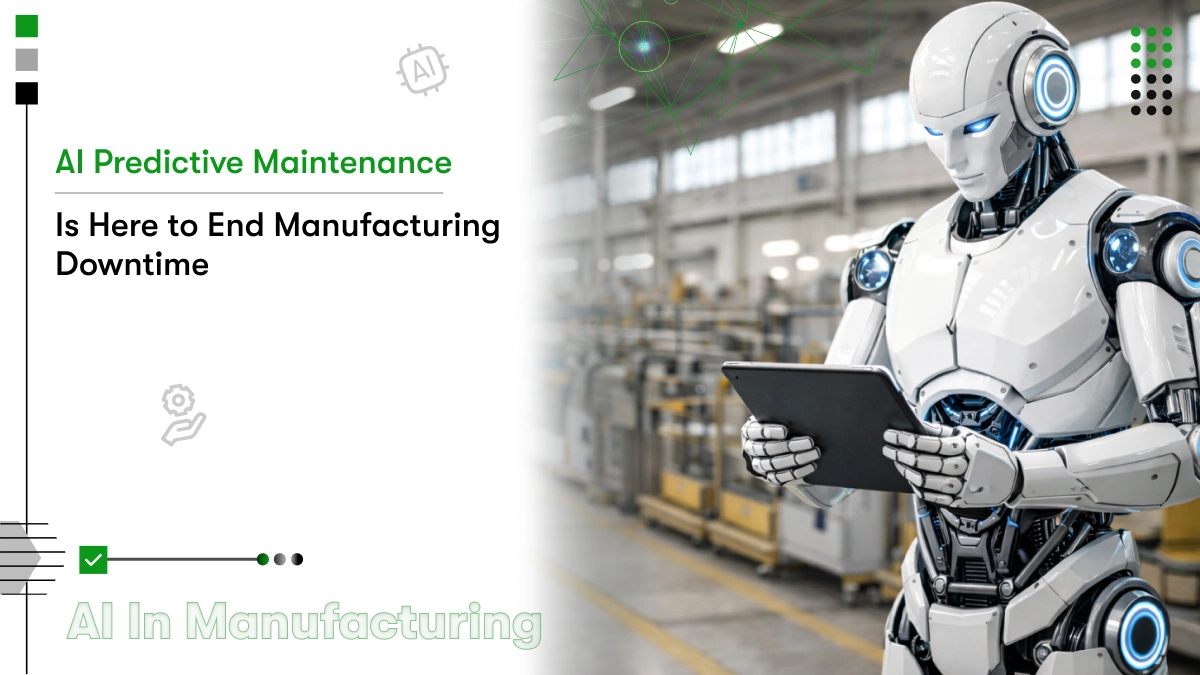






 Contact Information
Contact Information